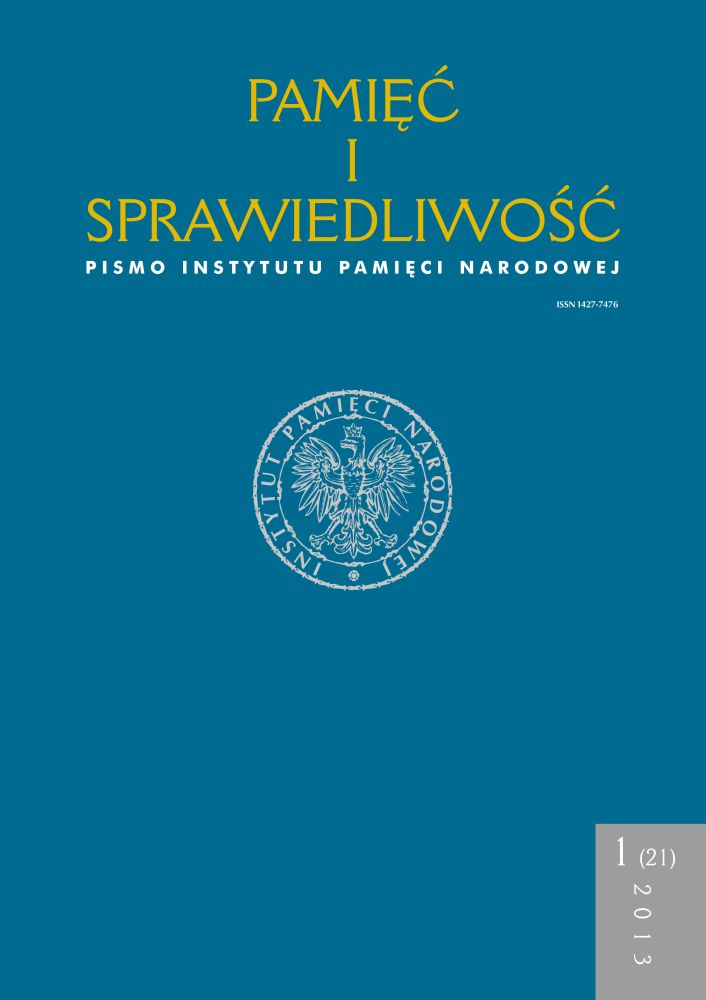Relacje między Zgromadzeniem Europejskich Narodów Ujarzmionych a Komitetem Wolnej Europy na tle polityki amerykańskiej 1950–1960
Pamięć i Sprawiedliwość, Bd. 21 Nr. 1 (2013), pages: 213-244
Publication date: 2013-06-30
Abstract
Literaturhinweise
Anna Mazurkiewicz, Relationship between the Assembly of Captive European Nations and the Free Europe Committee in the Context of U.S. Foreign Policy 1950–1960) [w:] The Inauguration of Organized Political Warfare: Cold War Organizations Sponsored by the National Committee for a Free Europe, red. Katalin Kádár Lynn, New York–Budapest 2013, s. 91–130. F. Gadomski, Zgromadzenie Europejskich Narodów Ujarzmionych. Krótki Zarys, Nowy Jork 1995, K. Kolęda, Assembly of Captive European Nations – ACEN jako ogniwo systemu wojny psychologicznej Stanów Zjednoczonych, Warszawa 1972, Polska emigracja polityczna. Informator, reprint, red. D. Piskorska, wstęp S. Cenckiewicz, Warszawa 2004, P. Stanek, Powstanie i działalność Zgromadzenia Europejskich Narodów Zjednoczonych (ACEN) w świetle Archiwum Feliksa Gadomskiego [w:] Prace uczestników studium doktoranckiego. Historia, red. A. Filipczak-Kocur, Opole 2007, s. 69–99, A. Mazurkiewicz, Assembly of the Captive European Nations: „The Voice of the Silenced Peoples” [w:] Anti-Communist Minorities: Political Activism of Ethnic Refugees, red. I. Zake, New York, s. 167–185, R.W. Rybicki, Stefan Korboński (1901–1989) [w:] Stefan Korboński 1901–1989, red. M. Ptasińska-Wójcik, Warszawa 2009, s. 15–59, P. Ziętara, Emigracyjne lata Stefana Korbońskiego, „Zeszyty Historyczne” 2009, nr 170, s. 3–64 Stefan Korboński [w:] Słownik biograficzny Europy Środkowo-Wschodniej, red. W. Roszkowski, J. Kofman, Warszawa 2004, s. 625–626, P. Stanek, Udział Stefana Korbońskiego w pracach Zgromadzenia Europejskich Narodów Ujarzmionych [w:] Letnia Szkoła Historii Najnowszej 2007. Referaty, red. M. Bielak, Ł. Kamiński, Warszawa 2008, s. 117–126, E. Podgajna, Działalność Stefana Korbońskiego na emigracji, „Annales UMCS” 2007, nr 14, Sectio K, Politologia, s. 243–256. Vaclovas Sidzikauskas [w:] Słownik biograficzny Europy Środkowo-Wschodniej, red. W. Roszkowski, J. Kofman, Warszawa 2004, s. 1127–1128, A. Mazurkiewicz, The Schism within the Polish Delegation to the Assembly of Captive European Nations 1954–1972 [w:] Polish Diaspora in America and the Wider World, red. A. Walaszek, J. Pezda, Kraków 2012, s. 73–108, J. Faure, Croisade américaine en 1950: La délivrance des „Nations captives” d’Europe de l’Est, „Vingtième Siècle. Revue d’histoire” 2002, nr 73, s. 6, J. Faure, L’ami américain. Le Tchécoslovaquie, enjeu de la diplomatie américaine, 1943–1968, Paryż 2004, P. Machcewicz, Emigracja w polityce międzynarodowej, Warszawa 1999, Akcja niepodległościowa na terenie międzynarodowym 1945–1990, red. T. Piesakowski, Londyn 1999, Vilis Māsēns [w:] Słownik biograficzny Europy Środkowo-Wschodniej, red. W. Roszkowski, J. Kofman, Warszawa 2004, s. 803, R.P. Stebbins, The United States In World Affairs 1959, Nowy Jork 1960, K. Osgood, Total Cold War. Eisenhower’s Secret Propaganda. Battle at Home and Abroad, Lawrence 2006, P. Carlson, K Blows Top. A Cold War Comic Interlude Starring Nikita Khrushchev, America’s Most Unlikely Tourist, New York 2009, B. Kovrig, Of Walls and Bridges. The United States and Eastern Europe, New York 1991, Ferenc Nagy [w:] Słownik biograficzny Europy Środkowo-Wschodniej, red. W. Roszkowski, J. Kofman, Warszawa 2004, s. 883–884, - J. Tyszkiewicz, Otwarte okno w „żelaznej kurtynie”. Polityka administracji prezydenta Eisenhowera wobec Polski (październik 1956 – styczeń 1961), Wrocław 2003, K. Tarka, Emigracyjna dyplomacja. Polityka zagraniczna Rządu RP na wychodźstwie 1945–1990, Warszawa 2003, A. Mazurkiewicz, Die „Stimme Freies Polen” aus München. Radio Free Europe, die amerikanische Deutchlandpolitik und die deutsch-polnischen Beziehungen, „Inter Finitimos. Jahrbuch zur deutsch-polnischen Beziehungsgaschichte” 2008 (Berlin), nr 6, s. 146–170. S. Korboński, W imieniu Polski walczącej, Warszawa 1999. Ch. Gati, Stracone złudzenia. Moskwa, Waszyngton i Budapeszt wobec powstania węgierskiego 1956 roku, Warszawa 2006, L.H. Shoup, W. Minter, Imperial Brain Trust. The Council on Foreign Relations and United States Foreign Policy, New York, London 1977, Dziennik podróży dookoła świata [w:] S. Korboński, W imieniu Polski walczącej, Warszawa 1999, s. 377–498 S. Łukasiewicz, Trzecia Europa. Polska myśl federalistyczna w Stanach Zjednoczonych, Warszawa–Lublin 2010, A. Mazurkiewicz, Niejawna ingerencja rządu w swobodną wymianę poglądów” – Zgromadzenie Europejskich Narodów Ujarzmionych w zimnowojennej polityce Stanów Zjednoczonych [w:] Tajny oręż czy ofiary zimnej wojny? Emigracje polityczne z Europy Środkowej i Wschodniej, red. S. Łukasiewicz, Lublin–Warszawa 2010, s. 255–263, A. Mazurkiewicz, „The Little UNO” at 769 First Avenue, New York (1956–1963) [w:] East Central Europe in Exile: Transatlantic Identities, red. A. Mazurkiewicz, Newcastle upon Tyne 2013, V.M. Zubok, Khrushchev and the Berlin Crisis (1958–1962), Washington 1993, Foreign Relations of the United States 1958–1960, vol. X, cz. 1: Eastern Europe Region; Soviet Union; Cyprus, Washington 1993, S.J. Frese, Comrade Khrushchev and Farmer Garst: East-West Encounters Foster Agricultural Exchange, „The History Teacher” 2004, nr 38/1, s. 37–65. A. Adżubej i inni, Twarzą w twarz z Ameryką. Reportaż z wizyty N.S. Chruszczowa w USA, Warszawa 1960, S. Korboński, B. Coste, Lest We Forget, , E.V. Toy, Jr., The Right Side of the 1960s. The Origins of the John Birch Society in the Pacific Northwest, „The Oregon Historical Quarterly” 2004, nr 105/2, s. 260-283 Stefan Korboński W imieniu Rzeczpospolitej, Paryż 1954, Stefan Korboński W imieniu Kremla, Paryż 1956, Stefan Korboński W Imieniu Polski Walczącej, Londyn 1964, Stefan Korboński Między Młotem a Kowadłem, Londyn 1969,, Stefan Korboński Polskie Państwo Podziemne – przewodnik po Podziemiu z lat 1939– 1945, Paryż 1975, Stefan Korboński Za Murami Kremla –Opowieść Fantastyczna, Nowy Jork 1983, Stefan Korboński Polonia Restituta – wspomnienia z dwudziestolecia niepodległości 1918–1939, Filadelfia 1986, Stefan Korboński Bohaterowie Polskiego Państwa Podziemnego – jak ich znałem, Nowy Jork 1987, Stefan Korboński Polacy, Żydzi i Holocaust, Komorów 1989 „Department of State Bulletin” 1964 „ACEN News” 1955, 1964 „New York Times” 1959, 1960 „New York Herald Tribune” 1960 „New York World Telegram” 1959 „Washington News” 1959 „Svoboda. Ukrainian Weekly” 1959 „The Ukrainian Weekly”, 1960 „Christian Science Monitor” 1959
Am häufigsten gelesenen Artikel dieser/dieses Autor/in
- Anna Mazurkiewicz, Relacja z sesji naukowych zorganizowanych na European Social Science History Conference przez uczestników Centralnego Projektu Badawczego IPN „Polska emigracja polityczna 1939–1989”, Wiedeń, 23–26 kwietnia 2014 roku , Pamięć i Sprawiedliwość: Bd. 24 Nr. 2 (2014)
 Język Polski
Język Polski
 English
English
 Deutsch
Deutsch
 Français (France)
Français (France)
 Italiano
Italiano
 Русский
Русский


 PDF (Język Polski)
PDF (Język Polski)
